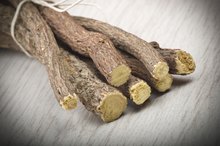The Effects of Smoking Chamomile
Herbal preparations have been used for health and enjoyment since the Neolithic times. While many herbal treatments are administered through means of food, drink or compresses, some components found in herbs are more accessible through smoking or vaporizing the herb. Chamomile has specific beneficial properties that are released through smoking or vaporization.
Medicinal Uses
There are a variety of medicinal uses of smoking mixtures. You can use chamomile to relax physically or mentally, according to "Dr. Andrew Weil's Guide to Optimum Health," or as an antispasmodic for stomach cramps and gas, says author Matthew Wood's "The Book of Herbal Wisdom: Using Plants as Medicine."
Transitional Help
Dangers of Smoking Damiana Leaves
Learn More
You can smoke chamomile when making a transition from the harmful effects of smoking tobacco. Because chamomile is a buffer to stress and anxiety, the more nutritive effects of smoking medicinal herbs may reduce tobacco cravings until the behavioral patterns of smoking are able to cease, according to "The Book of Herbal Wisdom: Using Plants as Medicine."
Restful Sleep
Weil says chamomile has the ability to enhance ability to sleep whether consumed as a tincture, a tea, a nutritive food, or when smoked or vaporized. If you struggle with anxiety or stress related tension, chamomile may be helpful in promoting relaxation or sleep.
Considerations
How do I Cleanse the Body When Quitting Smoking?
Learn More
Smoking any herb does elevate the risk of lung damage, which is why it may be advisable to locate a vaporizer as an alternative to smoking if you wish to use herbs in this manner. Vaporizers come in a variety of sizes, shapes and price ranges, and offer all the benefits of smoking chamomile or other medicinal herbs without any of the potential side effects.
Related Articles
References
- Columbines School of Botanical Studies: Herbal Smoking Mixtures
- "Dr. Andrew Weil's Guide to Optimum Health"; Andrew Weil: 2005
- "The Book of Herbal Wisdom: Using Plants as Medicine"; Matthew Wood; 1997
- Health Information Library: Roman Chamomile. PennState Hershey/Milton S. Hershey Medical Center.
- Chamomile Fact Sheet. National Center for Complimentary and Integrative Health.
- Amsterdam, J., Shults, J., Soeller, I., Mao, J., Rockwell, K., Newberg, A. (2013). Chamomile May Have Antidepressant Activity in Anxious Depressed Humans - An Exploratory Study. Alternative Therapies in Health and Medicine. 18(5): 44–49.
- Rice, C. (2017). Essential Oil Dilutions & Conversions Guide. Mountain Rose Herbs.
- Sándor, Z., Mottaghipisheh, J., Veres, K., Hohmann, J., Bencsik, T., Csupor, D. (2018). Evidence Supports Tradition: The in Vitro Effects of Roman Chamomile on Smooth Muscles. Frontiers in Pharmacology. doi:10.3389/fphar.2018.00323.
- Shinomiya K, Inoue T, Utsu Y, Tokunaga S, Masuoka T, Ohmori A, Kamei C. (2005). Hypnotic activities of chamomile and passiflora extracts in sleep-disturbed rats. Biological and Pharmaceutical Bulletin.
- Srivastava, J. K., Shankar, E., & Gupta, S. (2010). Chamomile: A herbal medicine of the past with bright future. Molecular Medicine Reports, 3(6), 895-901. doi:10.3892/mmr.2010.377.
Writer Bio
Sara Clement has been a writer, editor and social-media expert since 2002. A regular contributor for publications such as "Exhale," "Reflections of a Butterfly" and "The Giggle Guide," she is currently writing a book about grief and loss and coauthoring a sequel to "Being Ourself." She holds a Bachelor of Arts in premedical science and psychology/education from the University of Montana.









